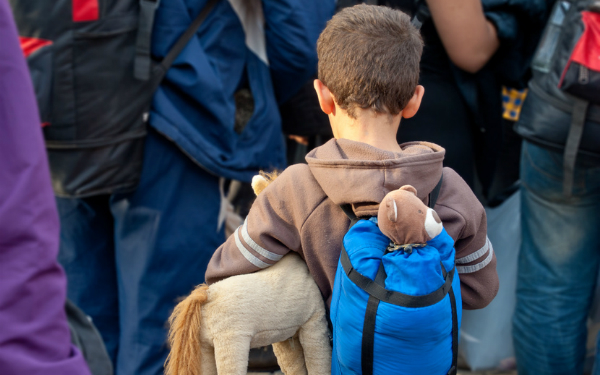Hampshire County Council’s two refugee teams were launched in February 2023 to meet the needs of an increasing number of unaccompanied children seeking asylum.
While the local authority supported 106 unaccompanied children and young people in March 2022, as of November 2024, it supports 293 unaccompanied children and 306 unaccompanied care leavers.
This has created increased need for foster carers, and also more opportunities for social workers to specialise.
This is what drew Harriet, a social worker in one of Hampshire’s refugee teams, to the outstanding-rated authority.
“I wanted to come and work in Hampshire because it enabled me to work in a specialist team, whereas other places I have worked in before didn’t offer that specialism,” says Harriet, who has also worked with adult refugees in Uganda.
The benefits of specialist teams
The advantages of having a dedicated team for unaccompanied children seeking asylum and care leavers are clear for Harriet. Children and young people benefit from having a team of practitioners focused on their care, with knowledge of the asylum process and legislative changes.
“What also helps is that within the teams, social workers work alongside family practitioners and personal advisers and this mix means there are opportunities to share ideas and ways of working,” says Harriet.
Debbie Dunne, who manages one of the two teams, agrees.
“We have practitioners who have the specialist knowledge base and understanding around culture, communication and languages,” she says.
The two teams each have around six social workers, two family practitioners and six care leaver personal advisers (PAs).
When children are assigned a PA, before they turn 18 and leave care, that practitioner follows them through the rest of their social care journey, promoting continuity of support and helping them feel safe and supported.

Practitioners aim to provide continuity and support to children and young people. Photo: Studio Romantic/AdobeStock
Wide range of skills
Within the teams, there is a mix of experience, with some members having language skills, one having completed a master’s degree in international development, others having skills teaching English as a foreign language and some having lived overseas.
There are also two trained foster carers in the team – one who is training to become a social worker and the other a PA.
“It seems that the teams attract people that want to do something different,” says Debbie.
Hampshire also gives its workforce five continuing professional development (CPD) days a year, which allows practitioners in other teams to come and see first-hand how the refugee teams work.
Debbie adds: “I’ve had one colleague from one of the frontline court holding teams (safeguarding), who heard about the team, spent a day with Harriet and met some of the children. She is now moving ahead with her application [to join the team].”
Understanding young people’s experiences
Young people who arrive in the UK are normally referred to the National Transfer Scheme, which is designed to ensure that responsibility for children and young people is shared between local authorities.
The young people supported by the teams range in age from about 12 to 25 years old, although younger children have been supported by them too, says Sarah Marston, area director for Hampshire south east.
Children are supported right from the point of referral, with practitioners conducting a detailed assessment that looks for indicators of trafficking and checks their health and welfare. The teams use strengths-based tools, including motivational interviewing, and trauma-informed strategies to promote communication.
“The aim is to focus on understanding the young person’s experiences and risks and establish whether they’ve got any contact with their family,” says Debbie.

Children are supported right from the point of referral. Photo: Africa Studio/ AdobeStock
Trauma-informed practice
Children are likely to have experienced some form of trauma along the journey to the UK and, over the first six weeks, practitioners are tasked with supporting the children to manage that.
“We recognise that the children have been working on adrenaline for a very long time in very difficult circumstances that they have lived through, in terms of street homelessness, [lack of] access to basic food and shelter – all those very critical things,” says Debbie. “So, it is a huge shock for them to come into the home of the foster family.
“Part of what we do is ask our children about sleep – if they are having nightmares or flashbacks. We offer them sleep packs, lavender, a night light and squidgy balls and we talk about getting into a good sleep routine because we know that at night when you’re still, that’s when everything catches up with you,” she adds.
Tools such as the trauma triangle, tree of life work and the distress screening tool are part of the range of approaches that practitioners use to support the young person to feel safe. They also help to build up trust between the practitioner and the young person, according to Harriet.
The tree of life work helps the young people to connect with their home country and is a way for social workers to learn more about their families in a way that limits secondary trauma.
“We get the young person to draw a tree trunk and work with them to reflect on the skills and interests they have, where they got them from, or who gave them the skills,” says Harriet. “The branches represent hopes and wishes, the leaves the important people in their life and the fruits represent the gifts that these people have given to them.”
Opportunities to deepen relationships
Hannah Leat, peripatetic district manager at Hampshire, suggests that engaging young people in conversations about their favourite foods from home and assisting them in preparing these dishes can be a valuable method for practitioners to help them process trauma.
She explains: “Engaging children’s senses can be a useful tool in trauma-informed practice. Not just preparing food, but any activity that supports children to revisit sensory experiences in a positive, support environment can help them process some of their trauma, while engaging with their social worker in something fun and enjoyable.”
Along with social activities, such as bowling, or things as simple as going for a drive, it also helps social workers forge relationships with young people.
There are also opportunities for young people to socialise with each other through organised events, such as football coaching sessions. These provide the opportunity for young people who were trafficked together, and then separated during the placement process, to reconnect.
Involving parents in care planning
Working with the young people’s families, if possible, is useful in improving outcomes for the child. “We want to have contact with parents, which helps us to have a better understanding of the children’s formative years and any history and information,” says Debbie.
Even in situations where the parents cannot be with their children, the team makes every effort to include them in their child’s progress, such as how they are developing in their education.
Hampshire has been able to achieve some family reunifications, with Harriet involved in one in which three children were reunited with their father and three other siblings.

Children seeking asylum are children first. Photo: Africa Studio/ AdobeStock
Children seeking asylum are children first
Such moments where children and parents, or children trafficked with friends, can be reunited are an important reminder that children seeking asylum are children first.
“The trauma they have experienced is similar in some respects to the trauma that the mainstream UK cohort of Hampshire children have experienced,” says Sarah.
“They have experienced sexual abuse, and violence, they are separated from their carers or family. I think sometimes the labels take us away from that – the fact that these are children that have been traumatised and have had adverse experiences.”
To learn more about the Hampshire Approach and how motivational interviewing is implemented at the authority, take a look at the following articles:
Celebrating a mindset, not a model of social work
Motivational interviewing: what is it and how can you use it in social work
And to find out more about working in Hampshire County Council, check out the authority’s Employer Profile.





 Facebook
Facebook X
X LinkedIn
LinkedIn Instagram
Instagram